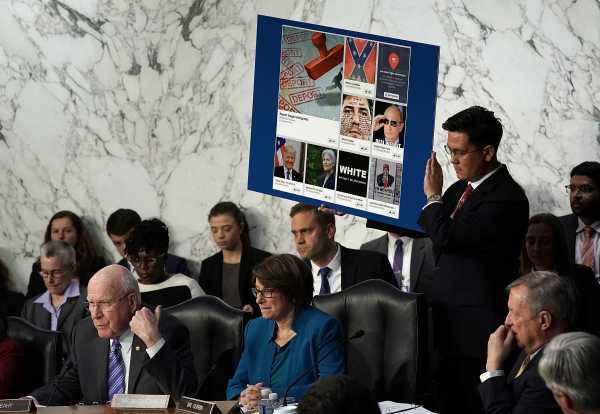
Twitter, Facebook, and Google have been less than eager to help the Senate Intelligence Committee with its investigation into Russian interference on their platforms, providing incomplete data or otherwise insufficient information for analysts to completely figure out what happened.
On Monday, the committee released two third-party reports outlining how the Internet Research Agency, the Russian troll factory behind the country’s online misinformation campaign, attempted to influence US politics and sow division before and after the 2016 election. The reports provide insights into multiple facets of the IRA’s activities, such as how it used Instagram and specifically sought to target black voters. But it also criticized the tech companies that Russians leveraged for falling short when it came time to deliver information to help investigators figure out what went on.
According to New Knowledge, a cybersecurity company based in Austin, Texas, that produced one of the reports, Twitter, Facebook, and Google “did the bare minimum possible” to meet the Senate committee’s requests.
Oxford University’s Computational Propaganda Project, which put together the other report, was not as blatant in its criticism but also emphasized a need for sharing data about public problems to be “more than performative.”
The criticisms are part of an expanding narrative around the way social media companies are approaching the often dim effects of their platforms: They make a public show of apology and efforts to improve, while in the background dragging their feet and failing to take the issues surrounding them seriously.
The platforms provided information to the Senate Intelligence Committee, just not all of it
According to New Knowledge’s report, the IRA’s misinformation operation reached 126 million people on Facebook, at least 20 million people on Instagram, and 1.4 million Twitter users, and uploaded upward of 1,000 videos to YouTube, which Google owns. Those conclusions are based on a data set that included 10.4 million tweets, 1,100 YouTube channels, 116,000 Instagram posts, and 61,500 Facebook posts, which combined saw tens of millions of engagements.
But the report suggests these findings are incomplete because none of the companies turned over as much as they could. They didn’t include methodologies explaining how they identified Russian accounts, nor did they include user comments, a maneuver presumably meant to protect user privacy but that ultimately prevents analysts from getting a clear picture of impact. They also didn’t provide the data necessary to figure out how users started to follow certain accounts.
The report pinpoints specific shortcomings of each company. Twitter, for example, provided shortened links, and it didn’t include accounts that many observers thought were Russian that engaged in “narrative manipulation” in 2017. It specifically points to a Twitter account under the handle @umpire43 that spread a rumor about one of the women accusing Alabama Republican Senate candidate Roy Moore of sexual misconduct.
The Oxford report dings Twitter and Facebook for limiting access to their APIs and says that Facebook only shared English-language activity, while Twitter covered activity in many languages. It also says that Facebook didn’t disclose profiles or groups discovered through its investigation but only shared organic posts from a small number of pages with the committee.
The report is particularly critical of Google for providing evidence that Russians bought ads as images and in PDF format, which isn’t machine-readable, instead of file formats that would have been easier for data scientists to analyze. “Google’s data contribution was by far the most limited in context and the least comprehensive of the three,” analysts wrote.
The New Knowledge report also takes aim at the companies for minimizing the IRA’s activity when it first became public, including in their statements to Congress. One company said that no specific groups were targeted by Russian trolls, which evidence shows is not the case, and another dodged questions about whether trolls sought to suppress the vote.
“It is unclear whether these answers were the result of faulty or lacking analysis, or a more deliverable evasion,” analysts wrote.
They said that Facebook deserves “commendation” for its efforts over the past two years to discuss influence operations more openly but notes that its initial efforts to downplay what happened still matter.
The New York Times last month documented Facebook’s behind-the-scenes attempts to deny and minimize controversies surrounding it, including the Cambridge Analytica data breach and Russia’s election interference. An April 2017 report on “information operations and Facebook” made no mention of Russia at all.
Tech companies might never be as forthcoming as we need them to be
A Twitter spokesperson said in a statement regarding the Senate committee reports that the company’s “singular focus is to improve the health of the public conversation” on its platform, which includes “protecting the integrity of elections.” The spokesperson also pointed to its release of additional data in October to enable further research on influence operations on Twitter.
A Facebook spokesperson said in a statement that the company provided “thousands of ads and pieces of content” and has made “progress in helping prevent interference on our platforms during elections.” Google representatives did not return a request for comment.
But as much as these companies might say that they’re trying to do the right thing, history shows time and time again that that’s not true, at least not entirely.
Facebook’s Mark Zuckerberg has been apologizing for his company’s missteps since its inception in his Harvard dorm room, and he’s spent much of this year on a public apology tour. On Friday, Facebook apologized yet again, this time for exposing private photos from up to 6.8 million users to 1,500 unauthorized apps. It discovered the breach on September 25. It didn’t say anything until December 14.
Google has been cagey about its plans to roll out a censored search engine in China, which was first reported by the Intercept in August. When asked about the matter at a congressional hearing last week, Google CEO Sundar Pichai said that Google has “no plans to launch in China” right now but wouldn’t rule it out in the future. (The Intercept reported on Monday that Google has shelved the project after internal and external backlash.) Twitter has persistently struggled to address harassment and abuse on its platform.
There are no clear answers as to who will fix social media’s problems, or how. But these latest reports from the Senate Intelligence Committee drive home the fact that we probably can’t expect Facebook, Twitter, or Google to do it, at least entirely.
Alex Ward contributed to this story.
Sourse: vox.com






